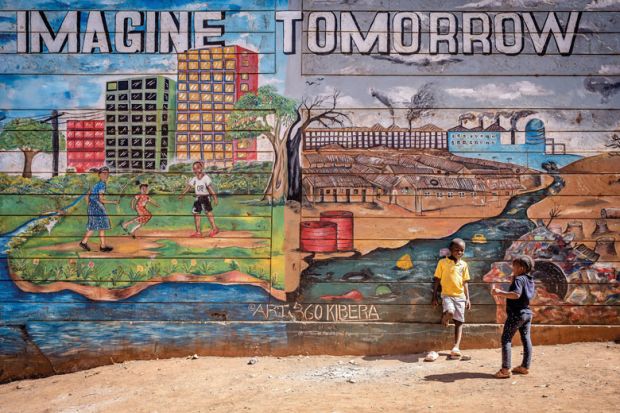When Sierra Leone was hit by huge landslides in 2017 – killing more than 1,000 people – the Association of Commonwealth Universities (ACU) wrote to institutions in the country to see if its network could do anything to help.
What was really needed, vice-chancellors responded, were better town planners “because a lot of the tragedy was based on the fact that houses were being built on unstable areas where they shouldn’t have been”, said Joanna Newman, the ACU’s outgoing chief executive, adding: “It always comes down to education.”
The ACU is today looking to develop a programme with the United Nations Human Settlements Programme that aims to use online education to rapidly train more architects and town planners in countries in the Global South, especially in areas experiencing rapid urbanisation.
“There will always be instability and war and oppression and refugees and climate disasters; it is how your institution responds to that and how, through international collaboration, for example, you can help,” said Dr Newman, who will join SOAS University of London as provost next month.
Campus resource: Decolonisation as a driver for the Sustainable Development Goals
The work draws on the ACU’s Partnership for Enhanced and Blended Learning that has worked with 23 universities across East Africa to rapidly expand their ability to deliver content in person and online, a model that is now being expanded to West Africa as well.
For Dr Newman, the initiatives show the enduring importance of the ACU, the world’s oldest international university network, and how the Commonwealth itself can act as a “laboratory for change” because of its unique make-up of countries, ranging from world powers such as the UK, India and Australia to tiny island nations.
Widely credited with transforming the 90-year-old organisation, Dr Newman has helped foster greater collaboration between the ACU’s 500 university members, establishing networks organised around the themes of climate resilience, peace and reconciliation, the sustainable development goals (SDGs) and research.
“The reason that international networks like ours work is because of the diversity in our network but also the ability to solve global challenges,” she said.
But disparities between the member countries are still stark, particularly in higher education participation, with countries in the Global South only graduating around 8 per cent of their populations on average.
For this reason, Dr Newman believes, the UN should recommend that governments spend a proportion of their budgets on tertiary education – building on the work the ACU has been doing in ensuring higher education is recognised as a key part of achieving the SDGs.
“There is already a recommendation that governments spend up to 20 per cent of budget on education as a whole,” Dr Newman said.
“I would like to see a suggestion that a percentage of that go to the tertiary sector. This should include colleges and skills training as well as more traditional university degrees. Opening up universities to less traditional ways of studying is also really important. That single thing to me would help move the dial on gross tertiary enrolment.”
Investing in universities across the world is all the more important in a globalised era, when a country’s brightest students may be tempted to travel abroad to study.
The ACU believes internationalisation is a “good thing”, Dr Newman said, but she would like to see more initiatives such as split-site PhDs, where students complete some of their doctorate at a university abroad and then return to their home country to finish their studies under joint supervision.
“That is a fantastic way of encouraging mobility – which matters I think – but also encouraging circulation and no brain drain by bringing people back,” Dr Newman said.
Mobility should go both ways too, she said, and to this end the ACU administers the Queen Elizabeth Commonwealth Scholarships scheme, which funds places on master’s degrees in low- and middle-income countries.
In 2022 the organisation also became a principal partner on the UK’s Turing Scheme, launched post-Brexit as an alternative to the European Union’s Erasmus programme.
Dr Newman said Turing has so far been successful at encouraging shorter periods of international mobility and its focus on widening participation has allowed “a lot of people to go overseas from the UK who possibly would not have gone before”.
Fostering more two-way collaborations and equitable partnerships between universities in areas such as research is key to the ACU’s future success, Dr Newman believed.
The Commonwealth as a whole has a “great future” but only if the larger nations remain committed and continue to see value in participating “as the smaller nations definitely do”.
POSTSCRIPT:
Print headline: Commonwealth can act as ‘a laboratory for change’
Register to continue
Why register?
- Registration is free and only takes a moment
- Once registered, you can read 3 articles a month
- Sign up for our newsletter
Subscribe
Or subscribe for unlimited access to:
- Unlimited access to news, views, insights & reviews
- Digital editions
- Digital access to THE’s university and college rankings analysis
Already registered or a current subscriber? Login








